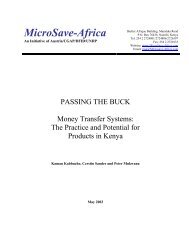You also want an ePaper? Increase the reach of your titles
YUMPU automatically turns print PDFs into web optimized ePapers that Google loves.
Donald R. Mickelwait<br />
(above right) worked<br />
for the Air Force<br />
and USAID before<br />
meeting Charlie<br />
Sweet at Harvard’s<br />
Kennedy School <strong>of</strong><br />
Government.<br />
After working at the<br />
U.S. State Department<br />
in Vietnam, Charlie<br />
Sweet (right) was<br />
thinking about a<br />
self-sustaining<br />
business model for<br />
doing economic<br />
development work.<br />
4<br />
which was enacted in 1961 and replaced two<br />
predecessor agencies with USAID. Perhaps just<br />
as important, Kennedy inspired a generation <strong>of</strong><br />
idealists with the creation <strong>of</strong> the Peace Corps,<br />
also in the first year <strong>of</strong> his presidency. Committed<br />
to working within the cultures and institutions<br />
<strong>of</strong> developing countries, Peace Corps<br />
volunteers—mostly young college graduates<br />
filled with enthusiasm and curiosity, but with<br />
little real-world work experience—went through<br />
intensive language training before starting<br />
two-year tours as teachers, health workers, and<br />
community development advisors in dozens <strong>of</strong><br />
poor countries, usually at remote rural sites.<br />
Collecting People<br />
Don Mickelwait and the founders <strong>of</strong> <strong>DAI</strong> had<br />
come to development around the same time<br />
as the Peace Corps, and ultimately they would<br />
work alongside many Peace Corps volunteers.<br />
However, their perceptions <strong>of</strong> the possibility<br />
<strong>of</strong> change in the developing world had been<br />
shaped more by work associated with the<br />
military in Southeast Asia. Their conviction<br />
that development work could be done on an<br />
entrepreneurial basis reflected an idealism <strong>of</strong> a<br />
different stripe from their Peace Corps counterparts,<br />
and one that was less widely accepted—<br />
for as the 1960s wound down, few Americans<br />
believed that economic development could be<br />
much more than a philanthropic exercise.



